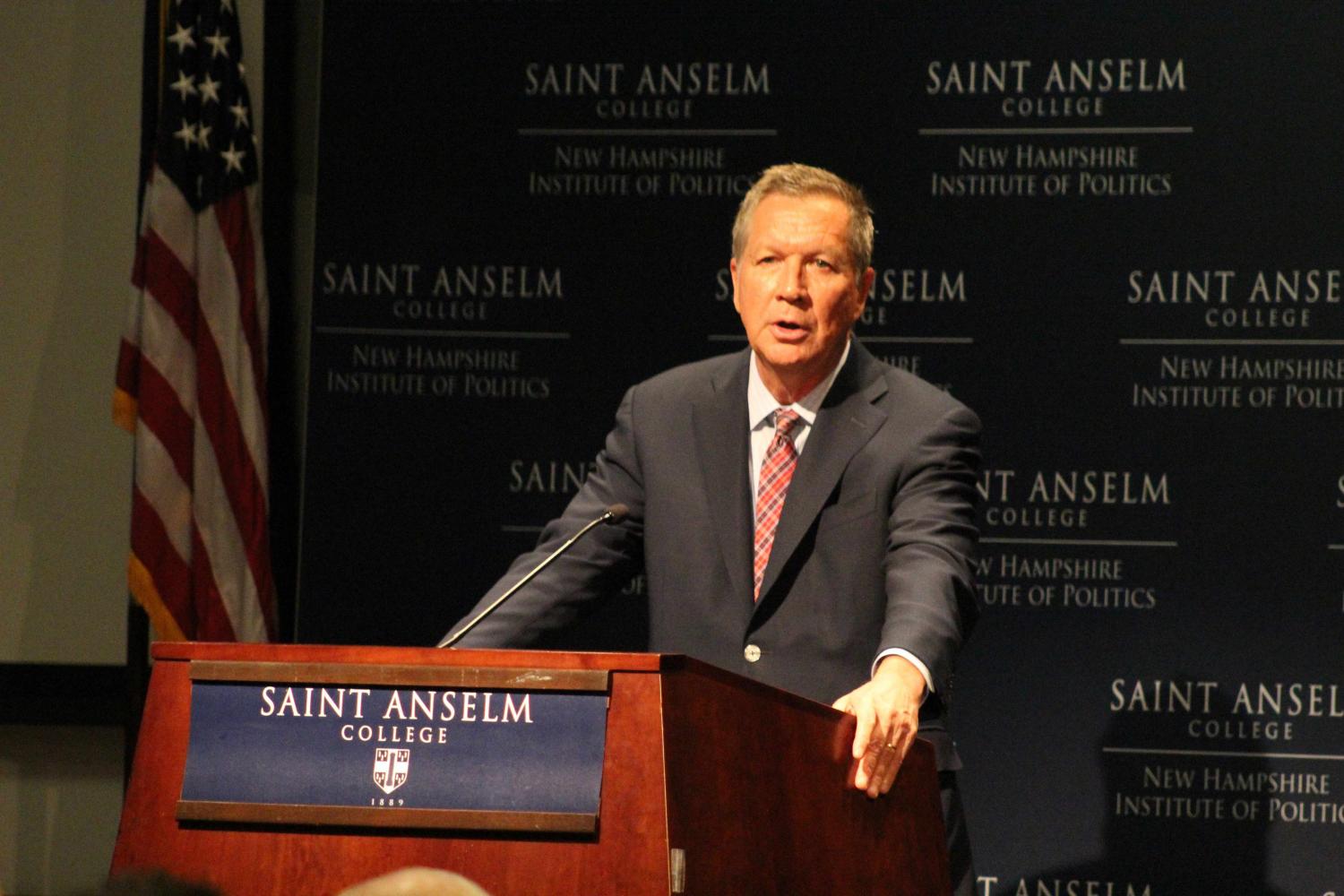Governor Kasich’s speech on campus fuels 2020 presidential race speculation
May 4, 2017
The week of April 23-30 former Maryland Governor Martin O’Malley, Governor John Kasich and Former Vice President Joe Biden all visited New Hampshire. Neil Levesque, director of the New Hampshire Institute of Politics told WMUR that, “Absolutely,” “This is the start” of the 2020 presidential cycle.
Kasich spoke at New Hampshire Institute of Politics on April 27 to promote his new book called Two Paths: America Divided or United.
The auditorium at the Institute was packed, with over 150 attendees. He began by thanking the New Hampshire residents for their support during the campaign, and lamented on his failed bid for the White House. “In the course of running for President, I was so boring, and boring wasn’t going to cut it”, he said.
His message centers around community, and the life each American should strive to live. Emphasizing selflessness, public service and faith were integral to Kasich’s thesis, and the main reason he wrote the book. “We need to live a life a little bit bigger than ourselves”, he said. He called for unity amongst political factions, and a devotion to local institutions. He calls Two Paths a “compilation of 28 years of being in public life.”
If problems are to be solved moving forward, he stressed the need for cooperation and bipartisanship. The Governor took questions from the audience. Zachary Camenker ’16, a current 7th grade teacher, asked about public education concerns. Kasich advocated for more online education opportunities, and for students in high school to spend time in the workforce.
Kasich has been the Governor of Ohio for over six years, and is a member of the Republican party. Born in a Pittsburgh suburb to parents of European descent, Kasich earned a State Senate seat at age 26, and was elected to the United States Congress at age 30. He served 18 years on the Armed Services Committee, and oversaw massive military funding during the Reagan era.
He helped broker a deal between Newt Gingrich and President Clinton while on the Budget Committee, and remained in Washington for the majority of his early years. As a fiscal conservative, he supported lower taxes and entitlement spending. He developed a “hawkish” reputation for his ardent military support, and this earned him the favor of Capitol Hill Republicans.
He supported the invasion of Iraq in 2002, but has later said the decision was a mistake. Kasich also worked in TV, hosting his own Fox News Show called Heartland with John Kasich from 2001 to 2007. In 2010, Kasich ran for Governor, and defeated an incumbent Democrat on his way to victory.
After 6 years in the Rust Belt, Kasich announced he would seek the Presidency. He polled well throughout 2015 and earned his way onto the debate stage with a field of 16 candidates. While it did not appear that Kasich was a serious contender for the nomination, he ascended quickly.
After the highly anticipated campaigns of Scott Walker, Jeb Bush and Chris Christie floundered, Kasich found himself near the top of the pack. In Iowa, Kasich finished 8th after devoting almost no attention to the state. Instead, Kasich spent days in New Hampshire, crisscrossing the state in every venue possible. He spoke at Saint A’s numerous times.
Kasich finished second behind Trump in the New Hampshire Primary. As a conservative, Kasich appealed to the middle class and social moderates, creating a broad based coalition. He would continue that momentum throughout the rest of the primary, finishing fourth in the national Republican primary.
After the Republican Convention, and as Donald Trump became their nominee for President, Kasich faced a tough challenge. He opposed Trump’s divisive statements and harsh rhetoric, consistently advocating for a more positive message. He refused to endorse President Trump during the campaign, and instead voted for John McCain who was not on the ballot.
The New Hampshire primary is a national event. If the New Hampshire primary is put on the level of other states, Kasich worries about the effect this would have on the First-in-the-Nation Primary. “The New Hampshire primary is special, but it has to serve as a way to let the country get to know people because the people here will make a good judgement, not just on policy, but also on personality,” he said. “Maybe this election was just an aberration, but I’d hate to see New Hampshire become just like every other state in the country.”



